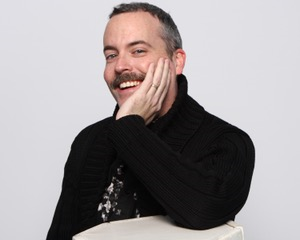Matthew Harris
I’m meeting Francisco tonight, and that’s when I’ll finally have my moment.
I finished at the coffee shop at five. Afterwards, I ran into Celeste at the LCBO. Celeste is tall and always busy—you’re lucky if she pays attention to you. “Hey Fag,” she said, rushing up to kiss my cheek.
“Why do I even go out anymore?” she continued. “I think I should stay in and do something constructive.”
“I say that every weekend. But every weekend I still go out.”
She looked me up and down. “Are you going to the Sham party?”
“My secret boyfriend is going, so I have to.”
“Leigh.” Celeste wagged her finger. “Are you dating a straight guy?”
“He’s going to be my gay boyfriend, but he doesn’t know it yet. It’s still a secret to him.”
“Funny.” Without asking me, she passed me some cans of beer. “Here. Drink these. I’ll see you there. It has recently come to my attention that I actually like people, and oddly, I enjoy spending time with them.”
At the cash, I told Celeste I was going to my dad’s interment the following weekend. I immediately regretted telling her. He had died three months ago. I’d already played the role of the grieving son for everyone. Talking about it again just felt greedy and pitiful.
But Celeste was not paying attention. “Oh that sucks,” she said, getting out her money.
After Celeste gave the cashier advice on her haircut—“You’d look great with straight-across bangs”—she gave me a hug on the street next to the homeless guy asking for change. She smelled like something clean and spicy; the cold buttons from her jean jacket pressed against my T-shirt.
“Tonight!” she said. “We’re still twenty percent young.”
“Tonight,” I said. “We’ve still got so much time to waste.”
◊ ◊ ◊
I pre-drank with my roommate, Ronnie. Ronnie said he was going, but he had made a dozen plans, and he usually cancelled all of them so he could take photos of himself in the bathroom and complain on social media.
While I made dinner, I danced in my underwear to one of Ronnie’s playlists. Ronnie watched. Ronnie wants to have sex with me, and I’m politically suspect because I have not made love to his imperfect but fully self-accepted body.
Ronnie has told me this: “Leigh, you think you’re better than me. I know you buy into all that body fascism.”
I have to deny it. But I think Ronnie would behave exactly like me if he looked like me.
My looks are my only gift. I’m not smart like Ronnie, or funny like Alexis, or bossy like Celeste. Keeping my body perfect is my religion. After every shower, I rub moisturizer with a high SPF into the pores of my cheeks, the fine skin of my hands, the sinews of my forearms. I destroy a pair of trainers every three months with all of my running. Every two weeks, my stylist shaves a precise line on my neck’s nape.
But my attractiveness is less something about me—it’s about what it does to other people. It overcomes them like a slow wave. It washes away walls inside of them, loosening their resistance to the words leaving my mouth, the way my hands touch their leg. It’s the only way I can win.
Ronnie said, as we ate, “I haven’t decided if I’m going to stay in and write an essay for my friend’s zine. But if I come out, you have to promise that you won’t abandon me for some conventionally attractive male.”
I looked at Ronnie’s too-large glasses, his long, dyed-blue hair. “I’d love to hang out, but I can’t promise anything. I’m going out to meet someone.”
Ronnie rolled his eyes. “It’s like nailing spaghetti to a wall.” He carried the empty plates to the kitchen. “You know, Darling, one day, you’re going to wake up and find it’s all gone. You’ll lose your hair, your skin will look like the Grand Canyon, and your asshole will be hanging out like a floppy inner tube! And when that happens, no one in God’s green Earth will want to fuck you because you will have nothing else to offer them.”
“You don’t think I know that?” I said, leaning back in my chair to shout to the other room. “That’s why I have to do it now! Carpe Diem and all that bullshit.”
◊ ◊ ◊
I showered and dressed, also listening to music, also drinking. It is important to drink and dance while dressing—the movement of your body tells you if the outfit works. The alcohol is there to melt everything—to take the choices out of your hands, and send them into the night.
Dancing, I chose black tights and an over-sized tank top. My nipples peeked out the sides. It was a sleek look, the emphasis was on my body. I put on a baseball cap and a sweet, musky cologne. With a pair of brightly coloured trainers, I knew I resembled an asshole, but that’s part of the look—to look impenetrable, to look so confident that if you criticize me, you know it’s partially out of jealousy and self-hatred.
Out on the street, I listened to a nameless tune from a “Party” playlist, more of an endless groove than a song. The trees reached darkly into the night, shrouding the street lights. People wandered in pairs and groups, occasionally shouting. We were all assembling our anticipations.
You always have to keep pushing your excitement down. Otherwise, you’ll peak too early. It wasn’t difficult for me. On the streetcar, sitting near the open window, watching the scenery and the people stream by, it was easy to remember the person who was not a person anymore.
Some days, it felt like my memory of him was like some chipped tooth: my thoughts, tongue-like, constantly worried the empty space. All of the questions about whether I was a good son or he was a bad father had dissipated, and now I was just left wondering what happens next. Nothing? There is something so unreal about his absence, something so nakedly alien, that sometimes just remembering it can momentarily cram everything I see into its cold and flat dimension.
The streetcar huffed and screeched at every intersection, dinging to let people on. Even in my chosen outfit, I watched the guys with fancy shirts glower at me, the girls glancing and tossing their tiny purses about, and I felt like a punchline. My aura had no power here. In fact, it was an opposite power, I drew looks that crumpled and shrunk me, that rubbed me out.
I stumbled off the streetcar, and my shoes were neon against the black pavement. I was still dogged by emptiness, but I laughed as my tank top swished around my body.
The queen at the bar door drew an x on my hand in black marker—I don’t have to pay, I’m one of those people. It was quiet. The really attractive gays hadn’t arrived yet, it was just some dudes in a dark room. The party was still not a party, but I got a vodka cran.
The patio was even quieter—music only filtered back when the bar’s screen door clanged open. Above, three stars pierced the city’s velvet night. Girls sat in a corner, chatting about a meme. A cat or raccoon banged around next door’s metal roof. I stabbed my drink’s ice cubes.
Right now was about experiencing every moment, about becoming a body. A good night slips out of the time stream; it is eternal.
The air was warm, but I shivered. I flexed my arms, examined the tensing muscles. Tingles coursed along my legs.
Alexis tripped onto the patio, nearly spilling her drink onto her band T-shirt. Alexis is always stumbling, she is always lighting the wrong end of her cigarette, she loses her wallet so often that her IDs are forever from the last six months.
She stood in front of me. “Hello, nipples!”
“I’m trying to fuck someone famous,” I said. “I’m definitely going to let my tits hang out.”
“Well, you do look like an anorexic actress. I can see your clavicle.” She pointed at it. “Your clavicle is showing!”
“Thank you!” I said. “You look gorgeous, too!”
Sitting down, she somehow got her shirt caught on the metal of her chair. She spent a moment detangling.
“Out on the street, though, I saw something you might not like.” She attempted a sip from her straw, and poked herself in the face. “Ow. I’m pretty sure I saw Francisco making out with a girl. Did you know about that? Maybe he’s not a ‘mo —maybe he’s a ho?”
I shrugged, immediately believing that I hadn’t gotten Francisco’s sexuality wrong, but that he had personally and individually rejected me, that he had re-considered all of my physical gifts and found the invisible flaw lurking within me. Was he laughing with the girl? He was probably laughing at me. Everyone at the party already knew about my embarrassment, everyone knew that I had been rejected. The night’s momentum was killed; the thread of eternity, snipped.
It was yet another few hours of my life to get through.
“After this drink,” I said, “Do you want to go dance?”
Alexis nodded and typed on her phone. “Let me tell Celeste that she should come, that we’re having so much fun.” She tapped hard against the phone’s smashed screen. “I’m only sending the funnest emojis.”
◊ ◊ ◊
Francisco is attractive, but he’s beyond attractive—he’s a hot photographer. When you go to any fashion website, you see a profile of him, fifty breathless words about his travels in Miami, Seoul, Stockholm, Buenos Aires. Everyone gossips about a photoshoot he did for that hot fashion designer last year, he’s drinking buddies with that theatre guy who won the MacArthur Fellowship, he’s being mentored by these rich fags in San Francisco.
He sometimes visits our coffee shop. His local office is above it, and we are one of the coolest coffee places: the high brick walls are painted white, and the menu’s written in an impossible-to-read font. He is usually with a few girls and guys, all of them thin, all of them wearing designer clothes that resemble industrial scraps. As I’m usually steamed and sweaty, my hair plastered on my forehead, my apron stained with coffee, I don’t even try to flirt, but he swims so confidently in his world that he chats with everyone, including me.
I passed him a coffee one day.
“Americano,” I said. “With room.”
“I don’t drink cream. Do I look like I drink cream?” He gestured to his non-existent belly.
“I’m sorry, I thought—didn’t you order it with room?”
He looked at his friend, a woman wearing a high-tech poncho.
“Here, pass it back,” I said. “I can give you more hot water.”
“I’m kidding,” he said. “Being so fit has probably affected your ability to understand a good self-directed fat joke.”
“No, I can.” I trailed off. Sweat was blotting my shirt. His female companion shook her poncho. At me, or at him?
“Like, look at you. You’re stupid fit,” he said. “Is that luck or genes or what?”
Joanne was stacking orders for me to complete, and the armpit dripping worsened. I wasn’t charming him; he was pitying me. I mumbled something, trying to hide my fear with annoyance.
But he said, “Cool! We’ll have to work out together sometime—you’ll have to show me your tricks.” And he and the woman left, laughing.
From then on, that’s what he did every time he came in: he’d say something flirty, and I’d angrily ignore him. And I was angry. I was angry that someone famous was talking to me, and he was talking to me as if I could respond in any sort of natural way, as if I could even pretend to be comfortable. He probably treated everyone like this, and that’s why he was so successful at such a young age, and why I was working at a coffee shop, serving him hot flavoured water.
It continued for months. It got so bad that I stopped serving him as much as possible, and I’d get Joanne to do his drinks for him.
But one day, I guess he decided to make a move or something, because while I was ringing through the customer who followed him, and he was on the way out of the shop with his entourage, he said to me, “Oh are you going to the Sham party this Saturday?” And I sort of grunted yes, because it was a party I went to every month, it was my favourite night out. And he said, “I heard it’s great. I’m leaving for a few months so I’m going to have a big blowout there. I’m looking forward to seeing you!” And he winked as he left, but it might have been some allergies, because as he exited the shop, a wind blew all sorts of dust and grit into their sarcastic haircuts and gorgeous rags.
◊ ◊ ◊
The dancefloor sat empty, so Alexis and I danced in big, dramatic moves. Nobody was looking at us, but I was starting to feel watched. Every one of my moves was for an audience. That’s part of making the night: getting the night to watch you.
But the news about Francisco weighed on me. My moves felt like they were not the right moves. My limbs dragged, drearily.
Then, the vibe shifted: a crowd burst into the club. Ronnie was dolled up in drag, and all of his Internet friends gaggled about his six-foot-four glamour. Some crushed toward the bar, others filtered to the dancefloor, laughing and bumping. The group was making their night; they had figured out that they were having fun. The room’s euphoria climbed.
Though I knew them somewhat, and their spirit was infectious, and even though Alexis was now dancing with them, I was locked outside of the fun. Ronnie’s friends crowded me toward the wall. I could tell that no one saw my face as an answer to their need. The heaviness in my feet got so bad I struggled to the washroom.
I waited for one of the single-occupant bathrooms. Passing by, Alexis flashed a peace sign, and tumbled onto a couch. Ronnie, towering over me, said, “Honey, don’t worry about babysitting me—I have scrounged together some friends. The Internet takes care of its own.” He sashayed past, trailing bedazzled, tatted, rainbow-haired queers of every possible gender.
And then! Francisco emerged from a bathroom with a breathtaking, handsome guy. He was a model, you could just tell. They were laughing. Francisco had his hands on the guy’s shoulders as he followed him. Were they doing drugs or having sex? It was worse than him being straight.
Francisco grabbed my elbow. “You came!”
“I came!” I fought back the disappointment.
“I have to go talk to some friends. But I’ll come talk to you later, okay?”
I nodded, not looking at him.
In the washroom, my shirt off, I flexed my muscles in the mirror until someone banged on the door, demanding that I share my drugs.
◊ ◊ ◊
I used to sit in the back seat of my mother’s Chevy Impala and sing along to her music. People and scenery would stream by, and I’d whisper along to the songs, because I didn’t want her to hear. The songs seemed to be mysterious messages from a fully grown-up world. Back then, I accepted the fact that I didn’t understand what the singers were saying—it was all mamma mia, mama say mama sa mama koosa. Instead, I mumbled along to the sounds. I guess I figured that one day, when I was old enough, when all of my flaws had revealed themselves as essential parts of an adult human being, the songs would make as much sense as they made to my mother.
My father didn’t like me singing. There may have been a part of him that saw it as a “gay thing,” that I was showing some gay side. But mostly, I think he didn’t like that I wasn’t very good at it. He didn’t like me being bad at things, and I was bad at things. I was bad at hockey, I was bad at math, I was bad at camping. He would ask me why I was bad at these things, as if I was good at knowing why I was bad at things. He would shake my crappy marks at me, and ask me, “Why did this happen?”
“I don’t know, Dad,” I’d say. “I’m just not very good.”
A week before he died, we were watching television in his hospital room. Aside from the television show, the only sounds in the room were his oxygen machine whirring, and those gentle mechanical beeps telling you that someone is still alive. An entertainment program came on, and I guess they ran out of Canadian television and film celebrities, because Francisco was there.
“I know him,” I said to my father. “He comes into the coffee shop sometimes.”
“Is he a friend?” he asked.
I shivered, dreading the drift of the conversation. “He’s no one,” I said. “Nobody at all.”
My father took a minute to continue because by that point, he found it difficult to breathe.
“Leigh?” He took a deep breath. “Did I ever make you feel bad?”
Getting what you want is only helpful if you get it quickly. If you have been wanting something for years, if you can’t remember a time the want didn’t nag you to sleep and dog you into your dreams, if you have found a way to bury the want so deep inside of yourself that it is the fertile ground by which every adult part of yourself flourishes—getting what you want, then, is like biting into a slice of birthday cake as it falls into ash.
“You shouldn’t worry,” I said. “I couldn’t have asked for anything more.”
“That’s not true, Leigh,” my father said. “I’m sorry. I hurt you.”
“It’s fine,” I said. “Save your breath, Dad.” I fiddled a coffee stir-stick between my fingers. “Save it for when you need to talk.”
After kissing him on the forehead and waving goodbye to the nurses, I drove home. I sprinted through yellow lights, flicked the indicator up and down. I was furious: for centuries, he had given me nothing, and I had built a beautiful, flawless shell around that nothing. Why was he changing the rules of the game now?
Some old song came on the radio. I mumbled along to the lyrics.
At that moment, I knew then what it would feel like after he died: nothing would be fixed. Everything would remain shattered and glittering, broken and frozen.
As I mumbled along with the song, the road’s dotted line flashing along to the beat, tears seeped from the corners of my eyes. They weren’t for him. Those would come later: in the hospital, in my apartment, in the checkout aisle of the grocery store. But right at that moment, I was remembering driving in my mother’s car, hearing all of those confusing messages from an adult world, everything that I thought I’d never understand. I wanted to go back to the time when I wasn’t beautiful. When everything was just mamma mia, mama say, mama sa, mama kossa. That was the person who needed to hear my father’s words.
◊ ◊ ◊
After the fourth vodka cran, the bar was swirling. The lights jagged and pulsed. The heat from the bodies smacked my face. People pushed past, leaving sweaty streaks on my shoulders, nearly jogging the drink out of my hand.
The night had settled in, everything flowed like a movie. We were characters in a comedy, the scene where everyone has a fun night out. We were relieved from making decisions because every decision we made was the correct one.
Out on the patio, people were in groups, shouting to one another over the noise of people shouting. I walked up to my friends.
Celeste grabbed my shoulders: “You know, I was a heartless bitch earlier. I should have said something more about your father’s interment.”
“Thanks,” I said. “It’s more weird than sad at this point.”
“There’s no right way to mourn—”
“You know. We don’t need to talk about this.”
“No problem, Gaylord.” She looked around the patio. “So, where’s the secret boyfriend?”
“Yeah, have you seen him?” Francisco said, suddenly appearing at my elbow. His close white T-shirt and his faint body odour set my heart thumping.
“I haven’t seen him yet,” I said. I dove in: I balled a fist and held it with my other hand. “He’s pretty unreliable.” My eye contact didn’t flinch. “I might have to find someone else.”
Francisco almost winced, and he fumbled for a cigarette.
“Do you know any hot guys that could fit the bill?” I grabbed his shoulder, and my other hand indicated the entire patio. “Is there someone I should go after? Is there anyone that is right under my nose—” I nodded toward him—“that I am not paying attention to?”
I was hitting him hard—I could see him trying not to smile, mouthing words he couldn’t release. He was leaning into my shoulder grip, so I moved it down, to his lower back. He was finally getting the cigarette to his mouth when I took it from him and put it behind my ear.
“We’ll save it for later, but let’s dance right now.”
I seized his hand and dragged him through the crowd.
Ronnie’s voice followed us: “There he goes! Again. Darlings, I’ve wasted so much of my life trying to find the right words. But the queens only want the right surface, surface, surface!—to skate away on.”
Inside, music clobbered the dark and crowded dance floor. We slid our way into the bodies.
The music rose, a soul piano bopped along to the beat. I tossed my hands about, I could feel Francisco watching me, fascinated. I knew that my face was yet more proof for him that his life was blessed. He was looking at me, trying to figure out why he could be so lucky. I saw him cover his eyes as he danced—he was overwhelmed with delight.
But this did not make me happy. It didn’t make me sad, either. It was just that effect I had. We would go home, have sex, the sex would be good, we would maybe see each other a few more times before he left, it would be fine, it would be okay, there’s nothing wrong with it, it is exactly the same as if we were together for twenty years.
The song had a vocal—it’s often the only way to tell if a song has changed. I remembered the melody, but I couldn’t remember the words, and the singer’s voice was so muffled I couldn’t make them out. But I mumbled along anyway.
“You know,” Francisco said to me, “if you don’t know the words, you shouldn’t sing along.”
“What are the words,” I said. “Tell me, and I’ll sing them.”
He shouted into my ear, but it was just noise.
“I prefer my gibberish. It’s better,” I said.
Francisco smiled that celebrity smile.
“It’s Leigh, right?” he said, touching my fingers. “You’re too perfect.”
“That sounds like an insult, Francisco,” I said. “Here’s a better compliment.” I held his shoulders. “Francisco, you’re incredibly hot and I want our bodies to have sex later.” I kissed him, and I could taste the confusion, the drugs and the alcohol on his lips. He laughed, breaking the kiss.
“Then let’s leave,” he said. “Let’s go to my place.”
“Ten more minutes,” I said. “Ten more minutes to get my life, and then we can leave.”
At that moment, the music broke into one of its regular crescendos. Everyone was cheering and clapping.
I clapped along. I moved my arms in and out with the beat. The sound filled every vein and every muscle, it burst from my pores.
I almost forgot that Francisco was looking at me, I almost forgot that I was part of a movie, that I was part of the night.
Inside the music and dancing and the lights above is a stillness.
I close my eyes, and mouth along with the gibberish. There is no anticipation, no build up. This is the moment that my whole week pivots on, my whole life revolves around.
It’s nothing, but I’m happy.
I opened my eyes.
“Okay, we can finish off the night,” I said to Francisco. “I’ve had my moment.”
 Matthew Harris has had fiction published in Grain, The New Quarterly, The Dalhousie Review, and The Malahat Review. While working on his collection of short stories, he teaches English at Humber College, and lives with his husband in Toronto.
Matthew Harris has had fiction published in Grain, The New Quarterly, The Dalhousie Review, and The Malahat Review. While working on his collection of short stories, he teaches English at Humber College, and lives with his husband in Toronto.






